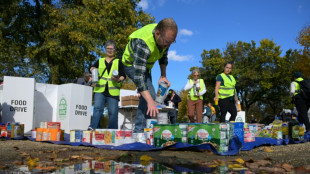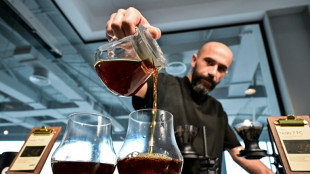
-
 Gstaad gives O'Brien record 21st Breeders' Cup win
Gstaad gives O'Brien record 21st Breeders' Cup win
-
After the tears, anger on Rio's blood-stained streets

-
 Sinner boosts number one bid in Paris, to face Zverev in semis
Sinner boosts number one bid in Paris, to face Zverev in semis
-
Springer back in Toronto lineup as Blue Jays try to close out Dodgers

-
 Nationals make Butera MLB's youngest manager since 1972
Nationals make Butera MLB's youngest manager since 1972
-
Guirassy lifts Dortmund past Augsburg ahead of Man City clash

-
 G7 says it's 'serious' about confronting China's critical mineral dominance
G7 says it's 'serious' about confronting China's critical mineral dominance
-
NFL fines Ravens $100,000 over Jackson injury status report

-
 NBA refs to start using headsets on Saturday
NBA refs to start using headsets on Saturday
-
Trump says Christians in Nigeria face 'existential threat'

-
 French-Turkish actor Tcheky Karyo dies at 72
French-Turkish actor Tcheky Karyo dies at 72
-
Food stamps, the bulwark against hunger for over 40 mn Americans

-
 Trump keeps world guessing with shock nuclear test order
Trump keeps world guessing with shock nuclear test order
-
Wall Street stocks rebound on Amazon, Apple earnings

-
 US Fed official backed rate pause because inflation 'too high'
US Fed official backed rate pause because inflation 'too high'
-
Prayers and anthems: welcome to the Trump-era Kennedy Center

-
 Swiss central bank profits boosted by gold price surge
Swiss central bank profits boosted by gold price surge
-
Sinner beats Shelton to boost number one bid in Paris

-
 French court jails Bulgarians for up to four years for Holocaust memorial defacement
French court jails Bulgarians for up to four years for Holocaust memorial defacement
-
Profits dip at ExxonMobil, Chevron on lower crude prices

-
 Ashraf and Mirza skittle South Africa as Pakistan win 2nd T20
Ashraf and Mirza skittle South Africa as Pakistan win 2nd T20
-
2,000 trucks stuck in Belarus after Lithuania closes border: association

-
 French lawmakers reject wealth tax proposal in budget debate
French lawmakers reject wealth tax proposal in budget debate
-
Premier League blames European expansion for lack of Boxing Day games

-
 Bublik sets up Auger-Aliassime semi-final at Paris Masters
Bublik sets up Auger-Aliassime semi-final at Paris Masters
-
World's most expensive coffee goes on sale in Dubai at $1,000 a cup

-
 Trump stirs global tensions, confusion with nuclear test order
Trump stirs global tensions, confusion with nuclear test order
-
Panic across US as health insurance costs set to surge

-
 Court eases ban on Russian lugers but Olympic hopes on thin ice
Court eases ban on Russian lugers but Olympic hopes on thin ice
-
England captain Itoje targets Autumn Nations clean sweep

-
 Calmer Sabalenka sets sights on WTA Finals crown
Calmer Sabalenka sets sights on WTA Finals crown
-
Spurs boosted by Romero return for Chelsea clash

-
 Sudan's RSF claims arrests as UN warns of 'horrendous' atrocities in Darfur
Sudan's RSF claims arrests as UN warns of 'horrendous' atrocities in Darfur
-
US says 'non-market' tactics needed to counter China's rare earth dominance

-
 China sends youngest astronaut, mice to space station
China sends youngest astronaut, mice to space station
-
From adored prince to outcast, Andrew's years-long fall from grace

-
 Rodri return fuels Guardiola belief in Man City title challenge
Rodri return fuels Guardiola belief in Man City title challenge
-
China holds send-off ceremony for space station astronauts

-
 Barcelona to show off unfinished Camp Nou with public training session
Barcelona to show off unfinished Camp Nou with public training session
-
Turkish court jails 11 for life over deadly hotel inferno

-
 Auger-Aliassime ends Vacherot run to reach Paris Masters semis
Auger-Aliassime ends Vacherot run to reach Paris Masters semis
-
Australia captain Wilson denies Wallabies use 'dangerous' breakdown tactics

-
 'Populists can be beaten': Dutch centrist Jetten claims election win
'Populists can be beaten': Dutch centrist Jetten claims election win
-
China's suspension of rare earth controls applies to EU: official

-
 Italy complains about strong euro, urges ECB to cut rates
Italy complains about strong euro, urges ECB to cut rates
-
Louvre to get anti-ramming barriers by year end: minister

-
 Wall Street bounces on Amazon, Apple earnings
Wall Street bounces on Amazon, Apple earnings
-
AI giants turn to massive debt to finance tech race

-
 Japan PM says raised 'serious concerns' with Xi on South China Sea, Xinjiang
Japan PM says raised 'serious concerns' with Xi on South China Sea, Xinjiang
-
Shein set to open first physical store in Paris


What we know about mystery hepatitis strain in children
An unknown, severe strain of hepatitis has been identified in nearly 170 children across 11 countries in recent weeks, with at least one child dying of the mysterious disease, according to the World Health Organization (WHO).
Here's what we know so far.
- Where has it been detected? -
The first five cases were flagged in Scotland on March 31 by "astute clinicians, realising they were seeing something unusual", said Meera Chand, director of clinical and emerging infections at the UK Health Security Agency.
The children did not have any of the five known hepatitis viruses, A, B, C, D and E, Chand told an emergency presentation at the European Congress of Clinical Microbiology and Infectious Diseases on Monday.
Such cases are very rare -- the Scottish doctors would normally see four to five unknown hepatitis cases in a year, she said.
The United Kingdom has since reported a total of 114 cases, the WHO said in an update on the weekend.
Spain had the next highest number of cases with 13, followed by Israel with 12 and the United States with nine, while small numbers have also been recorded in Denmark, Ireland, the Netherlands, Italy, Norway, France, Romania and Belgium.
- Who has been affected? -
Children aged from one month to 16 years old have had the mystery disease, but most cases have been aged under 10 -- and many under five. The large majority were previously healthy.
Before the children showed signs of severe hepatitis, they had symptoms that included jaundice, diarrhoea, vomiting and abdominal pain.
Maria Buti, a pathologist in Barcelona and chair of the European Association for the Study of the Liver (EASL), said the "main concern" is the strain's severity.
Seventeen of the children -- 10 percent of the 169 known cases -- had such severe hepatitis that they needed a liver transplant, she told AFP.
Aikaterini Mougkou, anti-microbial resistance expert at the European Centre for Disease Prevention and Control (ECDC), said the cases were "really worrying".
It was not clear whether even more children had mild cases because their symptoms were not traceable, she told the emergency presentation.
"As we do not know the cause, we do not know the transmission route and how to prevent and treat it," Mougkou said.
- What has been ruled out? -
Hepatitis is an inflammation of the liver and is generally rare in healthy children.
No common exposure seems to link the patients, the experts said, and the WHO ruled out international travel as a factor.
Chand said there was no link to paracetamol, overdoses of which can cause liver failure.
Any link to Covid vaccines has also been ruled out, because most of the children were not old enough to be jabbed.
- What is the leading theory? -
Adenoviruses -- common viruses that cause a range of sicknesses like colds, bronchitis and diarrhoea but mostly do not lead to severe illness -- were detected in 74 of the cases, the WHO said.
Chand said adenovirus was found in 75 percent of patients in the UK.
She said the "leading hypothesis" was a combination of a normal adenovirus along with another factor that was making it more severe.
One possibility is that young children who have spent their "formative stages" under Covid measures like lockdowns and mask-wearing over the last two years had not built up immunity to these adenoviruses.
Adenovirus rates in the UK plunged during the early stages of the pandemic but have spiked far above previous levels since measures were lifted, Chand said.
An "unexpected increase" of adenovirus cases has been recently recorded in several other countries, including Ireland and the Netherlands, the WHO said.
Other possible causes for the unknown strain could be a combination of adenovirus and Covid, or related to previous Covid infection, Chand said.
Nineteen of the 169 recorded cases had both Covid and adenovirus, while 20 had just Covid.
All the experts emphasised that ongoing investigations needed more time, but Buti said she expected results within a month.
- What can you do? -
Buti said that because adenovirus is an infectious disease, Covid measures work well against it -- particularly children regularly cleaning hands.
She also called on doctors to look out for signs of jaundice.
F.Pavlenko--BTB



